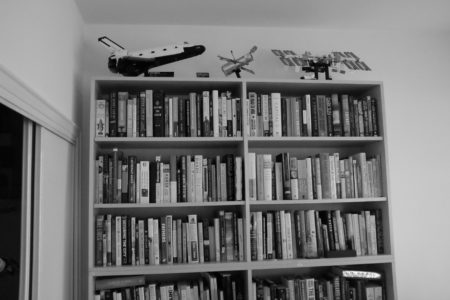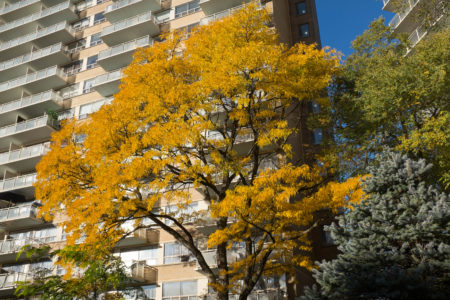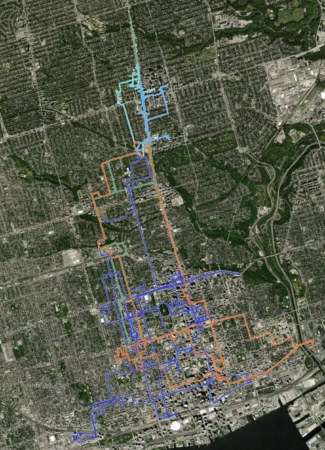Category: Daily updates
Generally musings of the day, usually accompanied by a photograph
Occupied
As a general rule, I post a lot here when I do not have projects ongoing that are linked to other people and I am focused on ‘making my own fun’ in the sense of doing self-directed and curiosity-motivated research.
When I do not post much here, it is because I am caught up in work involving other people. That is true now, and it is good.
Halfway through life
Tomorrow I am turning forty, which feels like the best guess for the halfway point of my life.
In the last couple of years — and especially recent months — I have been feeling incredibly isolated and rejected, as though I have no or hardly any active social relationships.
Perhaps we over-estimate the importance of birthdays around when they are happening. I had been struggling lately to recall what happened on many of mine, so I went back to my paper calendar records for a sense of history:
- In 2007, I had been in Ottawa for about three months after finishing my M.Phil and moving there for work. For my 24th birthday I had a dinner at the Ceylonta restaurant. I don’t specifically remember who was there, though some digging in electronic archives would probably produce invitation emails and/or a photo or two of the event.
- In 2008, it was drinks at The Manx pub.
- In 2009, I visited my family in Vermont and they gave me a birthday dinner before a hike in the snow.
- In 2010, I travelled back to Ottawa after a Toronto visit.
- For my 28th (“champagne”) birthday, I got my GRE scores and celebrated getting older with my cousins and some friends.
- In 2012, I had started at Massey College and was kindly invited for dinner in the residence of John Fraser, head of the college.
- 2013 was dinner at Big Sushi with a friend, where we sketched out a plot outline for a Massey College film noir which was never made but fun to think about.
- In 2014, the day began with cold pizza, an environmental decision-making class and a workshop on choosing a supervisory committee. That night, I had a party at my friend Tristan’s co-op house.
- For my 32nd birthday, I did a 3D printing course at the Toronto Reference Library and had dinner at Banjara with a friend.
- In 2016, it was lunch at Massey and dinner with the same friend, before a call with my brother Sasha.
- For 2017, it was dinner at Pomegranate with a different friend.
- I taught tutorials before a butter chicken lunch with another friend in 2018, followed by a dinner with an aunt and uncle, cousins, and my girlfriend.
- 2019 was a U of T Climate Strike and divestment teach-in, followed by dinner with a different friend.
- For 2020, I attended the annual lecture of Toronto’s Sherlockian society and held a Zoom call with friends.
- The plan for 2021 was a winter walk on the Toronto Islands, though only one brave soul undertook the six hour walk through slush with me. Then I had dinner with friends at home and some family video calls.
- Last year, I visited Seeker’s Books; attended the book launch for John Fraser’s account of the death of the queen; had a dinner of chili, de-alcoholized champage, blueberry pie, and vanilla ice cream at home with my girlfriend; and spoke on the phone with family and with Andrea and Mehrzad in Ottawa.
As with weddings, I think fictitious depictions of birthdays, and especially ‘landmark’ birthdays like 40, has given me some false expectations about how grand, popular, and enjoyable such events are meant to be. I think that feeling of not measuring up is now enmeshed with my deep and long-running feelings of anxiety and isolation over the last few years. It feels like the pandemic provoked everyone to draw back into smaller social circles, remain less in social contact, and generally be harder to recruit into any group activity. My sense of isolation and worry is no doubt heightened by my long, difficult, and not-yet-successful post-PhD job search.
Somehow I feel like my climate journey has ended up with me in basically the most isolated possible position. The world is full of people who just want to keep the fossil fuel party going. If you question that, you can find community among activists, but you will never fully belong if you don’t accept the analysis and prescriptions of their anti-capitalist and intersectional account of the crisis. For people seized with the need for drastic action on where we get our energy — but also skeptical about using climate change to justify a utopian project of global political and economic transformation — it is easy to end up with a sense of being a minority of one with little social connection to anyone. You get all the social and psychological penalties of being a committed critic of the status quo, but not the solidarity and community that comes from adopting a pan-progressive interpretation of the crisis and strategy.
My environmentalism has also inhibited social ties because of my avoidance of long-distance travel. I never went back to the UK after finishing my M.Phil, and so never retained active long-term relationships with the people who I met there. Likewise, my connections with people in Vancouver have thinned out and fallen away one by one over years and years of trying to stay in touch exclusively through telecommunications. I get a complex and weird mixture of feelings when I think about how avoiding travel has had such costs, especially since my example has not influenced anyone, and in the face of my conviction that focusing on individual emissions is the wrong approach to solving a crisis that can only be addressed at the societal level. It is a difficult irony to recognize that if I had not been avoiding travel for the sake of GHG pollution, I would probably be in a better position in terms of career and networks to make a meaningful contribution to limiting the harm that climate change will do.
For at least a year or two now, I have been hoping that we would soon turn a corner and start reverting to something more like social life before the pandemic. These hopes have been consistently disappointed. I feel like everyone is being ground down and eroded by all the worries and fears in the world, and one result of that damage has been losing the will, energy, or inclination to maintain and develop the social ties which often do the most to make life bearable. (And Joyous!) (And an Insane Unmissable Inexplicable One-off Gift – personally I plan to live for glory and to ride this bronco to the last buck)
One of the painful paradoxes of all this is knowing that expressing these feelings of pain and isolation tends to lead to even less social contact. It’s a simple enough matter of psychology that people seek out situations filled with positive emotions and pursue ways of repeating them. Contrarily, experiences characterized by painful and difficult emotions — however justified — conjure a desire to get away and avoid such situations in the future. It’s a bit like how people who already have good jobs are appealing to employers in a way those currently without work aren’t, or how being perceived as successful and desirable in romance and relationships makes you more appealing to prospective partners, while a perception that someone is undesirable to others often tees us up to consider them undesirable ourselves.
I don’t mean to mis- or over-state things, or to suggest that I am not grateful and have not had an extraordinarily fortunate life. I have always been lucky and have received a huge amount of care and kindness in my life to this point. Awareness of those thoughts never leaves me, as despondent as I may get at times about my current situation and as fearful as I have become about the future of the world.
Not travelling has led to a lot of sad, solitary holidays: especially Christmas eve nights spent alone. While the sadness of those occassions was acute, it was also tempered with a broader awareness that I did have the sort of friends who I could call up and get an answer from, and was a part of communities of shared effort. The short-term alone now stacked atop long-term alone makes it harder to keep that sense of perspective. Two of my most important relationships are also going through trials which I will not describe, but which have added profoundly to the sense of being alone in the world or at least widely socially rejected. Being done with school now also adds to the fear, since I know that school is generally the best context for finding adult friendships.
Thinking about forty as the likely halfway point of my life has made the lead-up to this birthday a time of considerable reflection about my life up to this point, coupled with imagination about what the future will involve. I don’t have a neat closer for this post. In part, that reflects my awareness of all the contradictions clashing in my mind — between feeling aware and grateful for a very fortunate life, but also feeling fairly desperate about the present and future — between being devoted to the movement for environmental protection, but feeling that my work and thinking has estranged me from people more than it has connected me to them, including in terms of being able to work together effectively on solutions — between awareness of the psychological importance of hope, but also the dangers of self-deception and complacency when we assume things will work out well in spite of the evidence and trends to the contrary.
Life is an unearned gift, but it is also hard and indeed cruel. Indeed, my philosophy in the last few years has developed to see that cruelty as central: you never get as much of anything good as you hope or expect, and every nice experience which you can pleasantly imagine being repeated many times in the future is liable to be unilaterally cut off without warning. The implication I take from that is to focus on gratitude for what has happened and on doing the very best I can at everything I do. I work hard to avoid the feeling that, for whatever I am doing, the present effort is just the first in a long string of future repeats. No repeats are guaranteed, so I try to do my very best at everything I do. In addition to making life feel vital, important, and meaningful, this approach actually reduces stress and planning anxiety since it lets me skip the question of how fully to commit myself to things. When the model is that you do your best at everything you attempt, from a hike to a piece of scholarly writing to a friendly interaction with someone else, at least then when the good things in life come to an unexpected end you don’t feel the regret that if only you had known how brief and fragile those situations and relationships were going to prove, you would have tried harder and made the most of things.
Internet-ed
As of last night, my new dwelling has that most indespensible of features that makes a modern building a home: home internet and wifi.
I had been holding off due to my lack of income, but my brother Sasha asked me to give a remote presentation to his class and I have had enough of the stress of trying to leach Starbucks and Massey College wifi for important meetings.
Books and lego space hardware in The Perch
Fall
Reviewing an unreleased book and TV show
While it won’t help with my rent, I nonetheless have some very interesting work for the next few days.
I am doing a close read twice of Professor Peter Russell’s forthcoming memoirs, which has been a privelege because of the respect I have for him as a thinker and a person, and a joy because of their colour, humour, and personality.
I am also previewing a new series of James Burke’s TV show Connections, which previously ran in 1978, 1994, and 1997. I have seen those old shows many times, and I thought a lot about his book The Axemaker’s Gift back in high school. I have the chance to interview him from Monaco on Wednesday, so I am giving the new material a careful viewing and thinking through how to make the best use of the conversation. There is scarcely a person I can think of who has a more educated and wide-ranging understanding of the relationships between science, technology, and human society. Since human civilization is presently hurtling toward a brick wall which threatens to rather flatten us all, it may be invaluable to get Burke’s views on how a defensive strategy from here can be undertaken.
Related:
Post-Old Orchard Properties move finished
Yesterday I got my steel bedframe, futon, pillows, and bedding delivered by my cousin Oleksa and his partner. I had no space for them in my temporary student co-op digs, and my aunt offered to hang on to them until I had a new place.
That means that the move which began in March when I learned that I would be forced to leave my room on Marlee Street because the landlords illegally refused to add me to the lease has finally ended. It also means no more sleeping on the floor with a yellow foam sleeping bad, Thermarest collapsible pillow, and light-duty MEC sleeping bag.
The next job search push
Because the pay working as a food delivery cyclist is so dismal — and because ultimately I need a job with career advancement potential and the prospect of doing useful work on climate change — I am beginning another round of job research and applications tomorrow: job portals for all levels of government, universities, academic publishers, energy companies, environmental NGOs, and really anything plausible.
The search is a bit of a grim one largely because of the very specific experience requirements for nearly any position I look at. Employers mostly want to take on someone who has recently done a very similar job and can provide references to show their aptitude at it. When it comes to applicants without experience who have the potential to be good at the work, it would be risky and counter-intuitive to hire someone promising over someone proven. The kind of entry-level jobs where it is possible to get in without prior experience, and where it is also possible to advance, seem to be vanishingly rare.
The social dimensions and office politics of climate change work are also a confounding factor. Even people and organizations whose job it is to highlight the severity of the crisis don’t appreciate being reminded of that in person. The world is full of thousands of people working on one narrow aspect of the climate problem, but pulling back to consider the scale of the problem overall compared with the scale of our efforts to combat it is deeply upsetting and demoralizing: especially to the sort of mid-career professionals with young kids who occupy most of the professional positions related to climate change. Having kids makes it psychologically intolerable to recognize the depth of our catastrophe, and the natural response to someone bringing up such uncomfortable ideas is to wrap the worry-inducing person up in smooth layers like a pearl until they are silent and no longer an irritant to the normal course of business.
Uber Eats bike delivery — break-even time in downtown Toronto
I have not been able to find another job, I love cycling, and I know the city — so I have been trying out working as food delivery rider for uber.
The lesson from 19.5 hours in is that it pays far below miniumum wage, even before considering any expenses.
At JJ International Inc at 438 Spadina I bought a large two-shelf insulated backpack for food deliveries for $84.76.
Since my total revenues, revenues per hour, revenues per delivery, and revenues per kilometre were all dismal in the first few days, I took a Smart Serve course in order to be able to carry deliveries with alcohol. The course took about 3 hours and cost $44.95.
Just now, I had to take a break from a Saturday night shift to go home because all my external phone batteries are dead.
In sum, so far:
- I have been online for 19 hours and 18 minutes.
- I have ridden 153 km.
- I have earned $150.04 ($116.55 in fares and $34.39 in tips).
- That works out to about $7.69 per hour, which is a considerable over-statement because it doesn’t count the riding time required to get into the high density zones with many restaurants or to ride back home.
- It took basically 17 hours of work to pay for the carrier bag and Smart Serve certificate.
All told, a person would be far better off working at the Ontario minumum wage of $16.55 than doing deliveries for uber eats by bike.




